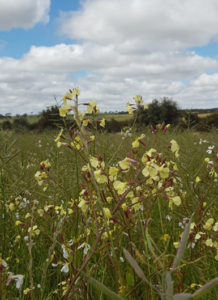
CROP TOPPING – CEREALS AND CANOLA
| Version 2 | Date January 2020 | Reference 73 |
- ENHANCE® and ANTIEVAP® increase efficacy by improving coverage, droplet survival and active ingredient uptake.
- In denser crops, the addition of
- ENHANCE® and ANTIEVAP® will increase droplet size thus increasing penetration through the canopy.
- Higher water rates improve coverage on small grass weeds.
- Adhere to product labels to ensure MRL’s are not breached and markets compromised.

Crop topping is becoming increasingly important to reduce seed set and prevent seed bank replenishment, particularly as weeds adapt to changing seeding practices and in-crop herbicides to germinate over a longer period. Even though only a small number of herbicides are registered for this use, they do offer the ability to utilise an alternate mode of action to incrop selective herbicides.
Products registered for crop topping include glyphosate (Roundup Ultra® Max, WeedMaster DST®), paraquat (Gramoxone 360 Pro®) and diquat (Reglone®). But not all crops are registered for these products eg, paraquat is not registered for use in cereal or canola crops (see Figure 1).




| Image 1,2 & 3: Timing is critical for effective weed set control with crop topping. Herbicides need to be applied when the crop is mature but before weeds have matured. Fig 1 – Flowering ryegrass, wild oats, and volunteer canola in barley. (Source: SACOA). |

| Chart 1: *Saflufenacil is labelled for use with a high quality MSO such as Plantocrop |
Late season application of herbicides needs to factor in the withholding period and approval of grain buyers. With some markets having tolerances lower than the Maximum Residue Limit (MRL) it is important to avoid herbicide residues in delivered cereal, pulse and oilseed grains.
As per GRDC recommendations, “it is essential that growers seek advice from their grain buyers before using late applications of herbicides. This is especially important for seed that is intended for sprouting”.
As a result, correct usage is essential. Product labels must be followed and withholding periods and buyer’s MRLs must be understood and adhered to for all herbicides. Rates referred to in labels have been developed specifically for the use pattern – ie a weed seed set reduction rate may be lower than that required for crop dessication. There is significant risk of residue carryover, particularly with paraquat use, late in the season if higher than label rates are used. If the aim is to dessicate a crop, alternative registered products such as glyphosate or diquat (Reglone®) must be used.
SACOA’s broadacre adjuvants ENHANCE® and ANTIEVAP® will improve the efficacy of both contact and translocated herbicides when applied late in the season, by improving coverage, droplet survival and active ingredient uptake, particularly in warmer conditions.
Timing and adequate coverage are the main issues to consider when planning crop topping, particularly if you are targeting ryegrass or brome grass.
To be most effective in stopping seed set, herbicides need to be applied prior to flowering or early grain fill with due consideration of harvest withholding periods.
In denser crops such as canola, the addition of spray oils such as ENHANCE® and ANTIEVAP® will increase spray droplet size, providing better penetration through the canopy and droplet deposition on the target weeds.
- Wheat
Wheat crops can be sprayed with glyphosate at the late dough stage or from 28% moisture in the grain onwards. Diquat can be applied as soon as the crop is mature and ready for harvest. Be aware that when spraying a wheat crop with glyphosate, there is a mandatory withholding period (WHP) of seven days before harvest. - Feed Barley
Feed barley can only be crop topped with diquat when the crop is mature and ready for harvest. Maltsters generally impose restrictions on its use on malt barley. Note that while diquat does not have a WHP when used as directed, glyphosate is not registered for crop topping barley. - Canola
Reglone® and Weedmaster DST® are the only products registered for pre-harvest spray topping for weed seed set control. Canola can be crop topped when 70 per cent of the pods are yellow and the seeds have turned from a green colour to brown, and it can be harvested four days after application.
Using ENHANCE® and ANTIEVAP® with registered herbicides along with higher water rates will improve coverage on small grass weeds below dense canola canopies.
Australian Oilseeds: Using Paraquat in Wheat, Barley and Canola
GRDC: Pre-Harvest Herbicide Use Fact Sheet
http://www.grdc.com.au/GRDC-FS-PreHarvestHerbicide
Disclaimer and Copyright
This document should act as a guide only and no purchase or usage decisions should be made based on the information provided without obtaining independent, expert advice. SACOA and contributors do not necessarily recommend or endorse any products or manufacturers referred to. SACOA Pty Ltd will not be liable for any loss, damage, cost or expense incurred or arising by reason of any person using or relying on the information contained in this document. More information is available from SACOA via sacoa.com.au or 08 9386 7666, or by contacting your local reseller.
© 2020 SACOA Pty Ltd All Rights Reserved. SACOA and the GREEN S icon, ENHANCE, CROPSHIELD, PLANTOCROP, BIOPEST, XSEED, ANTIEVAP, STIFLE, SE14 and LURE H2O are registered trademarks of SACOA Pty Ltd.



